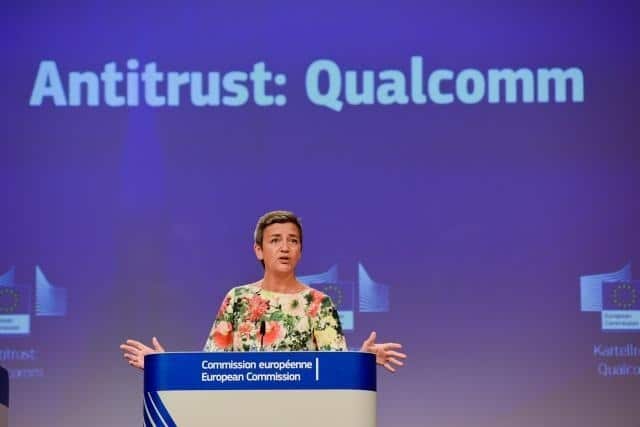The Commission fined today the American telecommunication company Qualcomm €242 million for abusing its market dominance in 3G baseband chipsets.
Qualcomm sold below cost, with the aim of forcing a competitor out of the market. This is illegal under EU antitrust rules.
Baseband chipsets enable smartphones and tablets to connect to cellular networks and are used both for voice and data transmission.
Competition commissioner Margrethe Vestager did not mince her words at today’s press briefing when she described the case as an example of predatory pricing with the intent to prevent other companies from entering into the market to the detriment of innovation.
“Qualcomm's strategic behaviour prevented competition and innovation in this market, and limited the choice available to consumers in a sector with a huge demand and potential for innovative technologies,” she underlined.
The Commission investigation found that Qualcomm abused its dominance between mid-2009 and mid-2011. Qualcomm sold certain quantities of its chipsets below cost to strategically important customers, with the intention of eliminating Icera, its main rival at the time in the market segment offering advanced data rate performance.
In May 2011, Icera was acquired by US tech company Nvidia, which decided to wind down its baseband chipset business line in 2015.
The fine of € 242 million takes account of the duration and gravity of the infringement but represents only 1.27% of Qualcomm's turnover in 2018. Asked about the size of the fine, Vestager said that it should serve as a deterrent against anti-competitive practices in the future. She added that a Commission decision is a proof which can be used in a national court to claim compensation damages.
The decision came too late for Icera, which was acquired by another company in 2011 which in turn decided to wind down the baseband chipset business line in 2015.
Vestager admitted that it took more time than usual to finalise the case since the Commission opened the formal investigation in July 2015. “Every procedural step in an investigation takes time and a lot of information is needed for price-cost tests,” she said. Qualcomm refused to provide information on its price setting and appealed to the courts.
“We have an incentive to speed up the process,” Vestager said, “the company has the opposite incentive.”
Although belonging to a different party, Margrethe Vestager has been re-nominated by the government in her home country Denmark for a post as commissioner in the next Commission and is expected to be nominated by the Commission President-elect Ursula von der Leyen to one of the two highest-ranking Vice-Presidents of the Commission.
The Brussels Times

